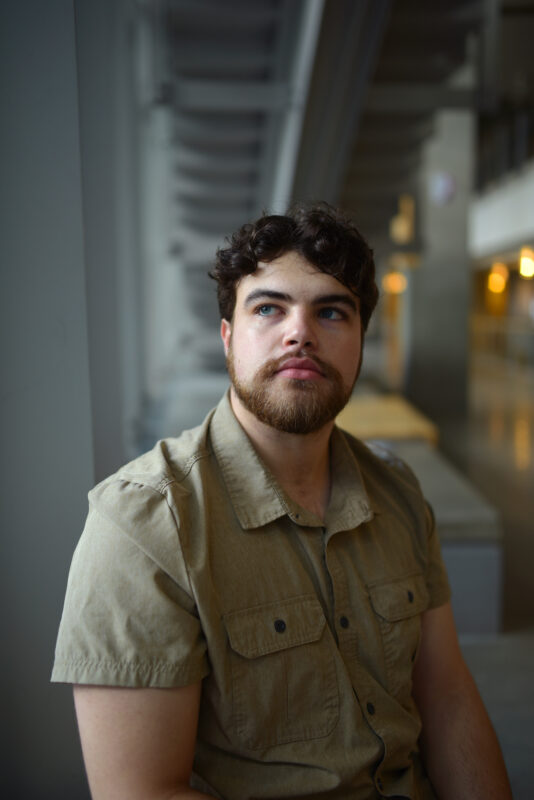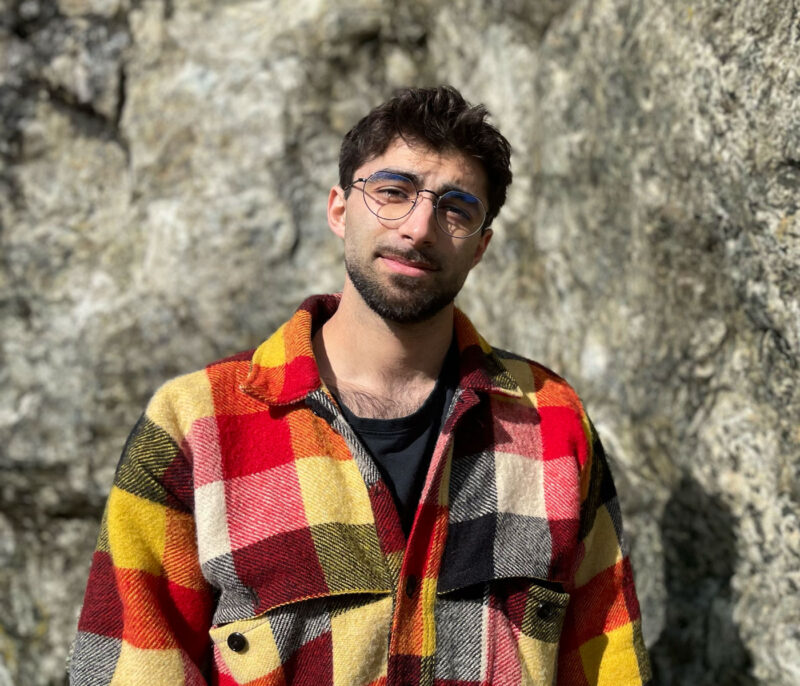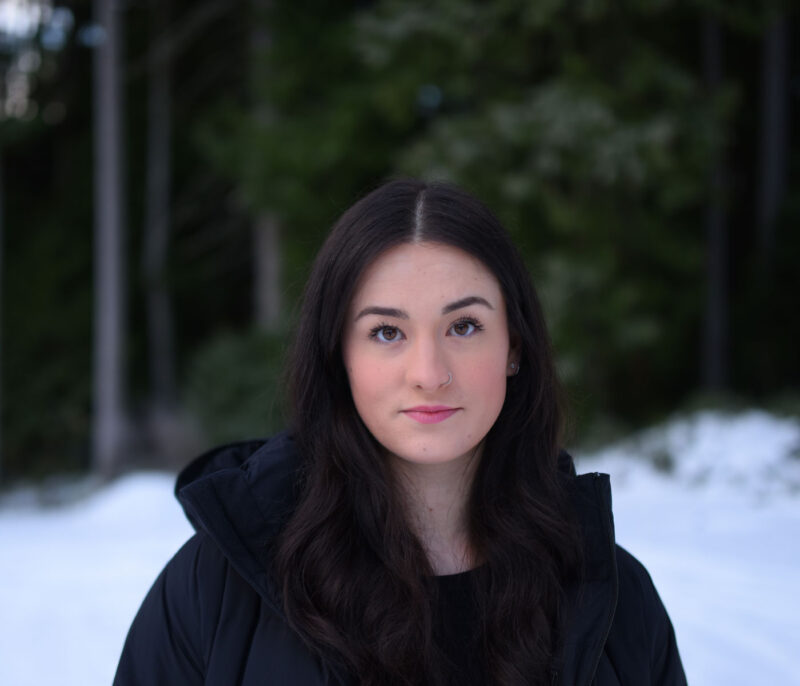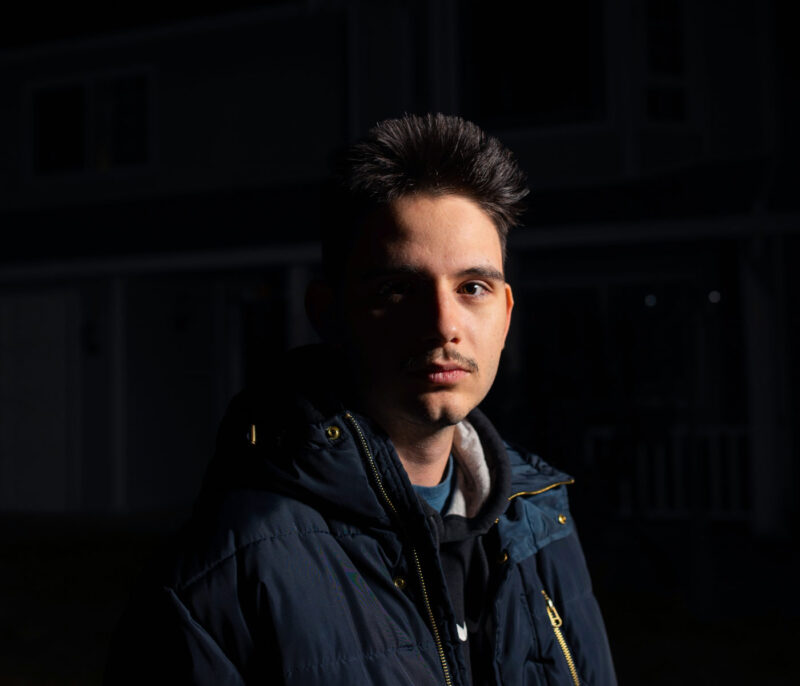“That was when climate change started to really kind of feel a little bit more real.”
Gage Smith

Gage Smith grew up in Lloydminster, a small town straddling the border between Saskatchewan and Alberta, and lived on the Alberta side near a large oil refinery. He now wonders whether that location might have something to do with the persistent cough that has nagged him his whole life. Born to parents who both worked as journalists, Gage was a self-described “hyper kid” and spent much of his youth hanging out with friends, watching Spider-Man, and not thinking too much about the environment.
When Gage was 14, he moved with his family to Calgary. The city is the headquarters for many of Canada’s oil and gas companies. It’s also less than an hour away from the Rockies. “It felt like utopia going from there to here,” in part because it’s like a mountain town: “the air and water quality here was so much better.” He would venture to the nearby resort communities of Canmore and Banff where he would go hiking.
Following in the footsteps of his parents, Gage enrolled in journalism at Mount Royal University in Calgary. To help pay for his studies, Gage worked during the summer break at Calaway Park, an amusement park outside of the city. On one particular work week that summer, the combination of smoke from wildfires in British Columbia and sweltering temperatures created a stifling—and hazardous—working environment.
There was a stretch of like a week, where the smoke was really, really bad. And it was hot. I had a coworker pass out. I had a bunch of people call in. People hacking and coughing. It was really bad. I had a really hard time with that.
There’s this one ride where, when you operate it, you’re on a metal platform. So it magnifies the sun on you. I had to work that for four straight hours. There are people that are supposed to bring you water. They were so busy that they didn’t get to me the whole time. And I was just dying. It was pretty rough.
I remember texting one of my friends and he has asthma.
He was like, “Yeah, I have to call in for like a week. I don’t know if I can keep this job anymore. I am screwed. It’s too smoky. I won’t be able to breathe. I can’t be out there today. I have to hide in my house for a week.” I was like, “Wow, that sucks, man.” But looking back on it now, I’m like, “Yeah, that guy could have lost his job basically, just because of climate change.”
I can’t imagine doing a job like construction and having to work through something like that. I was a teenager trying to pay for university and I was struggling. Imagine what it’s like for the worker on the highway in forty-five degrees with the smoke who has to put food on the table for his family. That was when climate change started to really kind of feel a little bit more real.
I do love it here, but I don’t know if I can imagine myself living here if it’s covered in smoke constantly. I know that we might be the last generation to look out our window and see the skyline of the city from a ways away, because these wildfires are just going to get more frequent. If it gets really bad, I might have to leave. So I appreciate the beauty of the natural world while it’s still here.
For the average person, I don’t think using less electricity or carpooling with your friends is gonna matter at all in the grand scheme of things. And I don’t think enough people could make that change. I think it’s in the hands of governments and corporations, and they have the power to make enough change to actually make a difference. And I don’t have any faith in them to do that.
Have you ever seen Pirates of the Caribbean? You know, at the end of the second one, when Jack Sparrow was fighting the Kraken, and he’s gonna get eaten, but he fights it anyway, even though he’s gonna get eaten alive. I feel like that’s the only attitude you can have towards climate change right now. “Okay, we’re dead. But whatever. Let’s die swinging.” Going to Mount Royal exposed me to that. It made me sit down and think about it and research it and care more about it. And now I know that we’re in deep shit, I don’t care ‘cause I still want to go down swinging.
I think the sense of urgency is the important thing. I think people should be aware of how big of a deal it is. Not too long ago, I didn’t really care that much about it. It felt so far away and it wasn’t really directly hurting people. I thought people were too scared of it. I thought there was a lot of soapboxing about it who pretended to care about it and didn’t.
But I’m realizing that most people who bring attention to it really do care. If we’re asking just the average person to do something about it. Just go read some research, go talk to some climate survivors, if you can. I think that would be enough for most people. Then everyone would make change within their own means. I still feel like things can change fast and that things aren’t quite set in stone yet. There is hope. Things can change for the better.
This testimony was originally published in Asparagus Magazine, on December 14, 2022.
Related Stories

Tosh Sherkat, Victoria, Canada

Mikaela Robinson, Hope, Canada

Brian Mirea, Abbotsford, Canada